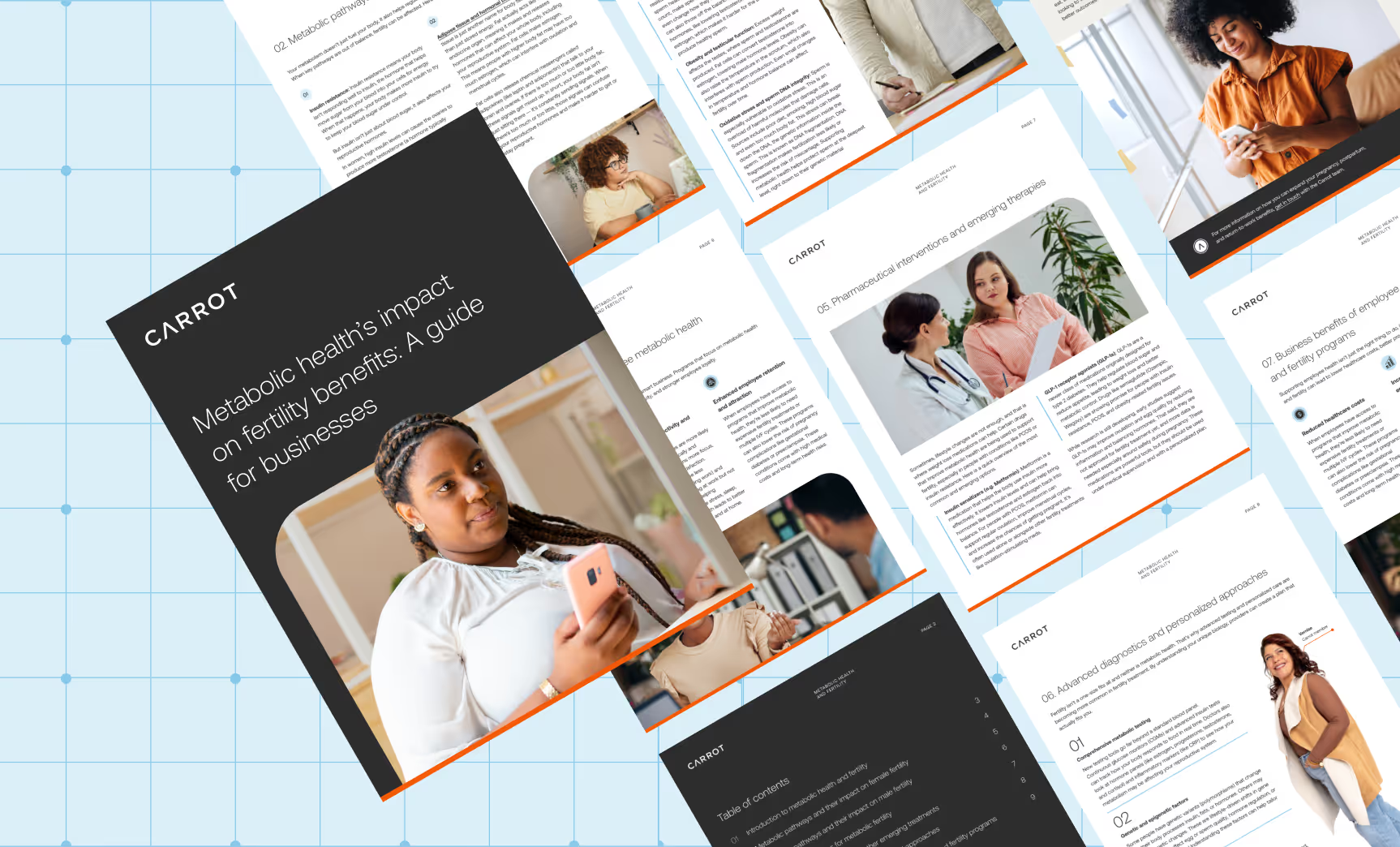Approximately 17.5% of the adult population — around one in six — struggles with fertility. Despite this, women are most likely to undergo medical fertility treatment, which can be highly emotionally and physically taxing.
Regardless of the cause of fertility problems, the effects are often the same: feeling isolated, difficulty concentrating, and even experiencing depression and anxiety. These effects stem from the physical, financial, and emotional stress of navigating fertility. Find out how stress and fertility connect, and how you can manage stress for better reproductive health.
What is stress and how does it affect fertility?
Even the calmest person you’ve ever met has experienced stress in their lifetime. Stress is your body’s natural response to any kind of challenge, whether it’s mental, emotional, or physical.
A little stress isn’t always a bad thing. Acute, or short-term, stress can help you focus or get through tough situations. But when stress sticks around for too long (chronic stress), it can affect your entire body, from your heart and sleep to your hormones and mood.
When you feel stressed, your body releases hormones designed to help humans survive danger by stimulating extra energy and sharper focus. The problem is that your body has to “choose” where to expend its energy: on survival or other functions. If stress hormones stay high for too long, your body may put survival first, which means your reproductive system can get less attention.
Here are some evidence-backed ways stress can negatively impact fertility:
- Interfering with the release of important reproductive hormones, such as luteinizing hormone (LH) and progesterone, which are needed for ovulation and early pregnancy.
- It may shorten the luteal phase (the time after ovulation), making it harder for an egg to implant in the uterus.
- High stress can also affect egg quality and even delay or prevent ovulation altogether.
- The stress associated with trying to fertility struggles can reduce sexual esteem, satisfaction, and the frequency of intercourse.
While short-term stress isn’t particularly harmful, ongoing stress may lead to irregular cycles, trouble sleeping, or poor eating habits — all of which can make it harder to get pregnant. Studies also link poor mental health before pregnancy to higher risks of complications like preterm birth or low birth weight. That’s why caring for your emotional health is just as important as caring for your physical health when you’re preparing to grow your family.
Common causes of fertility stress
If you’re trying to get pregnant, you may already know that fertility struggles bring more than just physical challenges. They also bring emotional, financial, and relationship stress that can take a toll on your well-being. Understanding the most common sources of stress can help you develop coping strategies.
Emotional stress
Pregnancy journeys come with big feelings, including anxiety, fear, sadness, and even shame. You may find yourself asking if this round will work or worrying about what the treatments are doing to your body. Some other common emotional stressors you may run into are:
- The pressure of tracking cycles and keeping up with medical appointments
- The side effects of fertility medications, such as mood swings, headaches, or nausea
- Societal expectations that tell you you “should” be able to get pregnant easily
- Feelings of isolation or inadequacy when treatments don’t go as hoped
When left unmanaged and untreated, emotional stressors can lead to depression, anxiety, or even post-traumatic stress disorder (PTSD).
Financial stress
Fertility treatments can be expensive. In vitro fertilization (IVF), one of the most common treatments, costs thousands of dollars per cycle — and many people need more than one attempt. This financial burden can add another heavy layer of stress, especially if you’re already worried about how your fertility journey will impact your work and emotional well-being.
Relationship stress
Struggles with fertility can place strain on relationships — romantic or otherwise. You might feel guilty about letting your partner down or worry that you’re “less than” because of infertility. These feelings can create tension, distance, or misunderstandings in otherwise strong partnerships. Dealing with fertility treatments might also create strain on family relationships and friendships due to the time and energy they require.
Health and body stress
The physical process of fertility treatment can be demanding. Daily medications, hormone injections, blood tests, and ultrasounds feel overwhelming, especially when paired with side effects like bloating, hot flashes, or fatigue. Your body is working hard, and it’s natural to feel worn out.
Stigma and self-worth
Across many cultures, infertility carries significant stigma. Some people may unfairly blame the birthing person, or you might face hurtful comments and assumptions. These experiences can impact a person’s self-esteem and add more pressure to an already challenging journey.
Workplace stress
Life doesn’t pause while you’re going through fertility treatment. Work responsibilities clash with medical appointments and create additional stress for people navigating fertility challenges. According to the American Institute of Stress:
- 83% of U.S. workers deal with daily work-related stress
- 39% say workload is their biggest stressor
- Nearly half report being disengaged at work
Balancing fertility challenges on top of normal work stress can feel overwhelming, and it’s important to recognize that both can feed into each other.
How to tell if stress is affecting your fertility
Stress doesn’t just live in your head! Stress can also show up in your body, your mood, and your daily routines. When you’re already navigating the ups and downs of fertility, that stress can start to feel like a cycle: the more you worry, the harder it can be to get pregnant, and the harder it is to stop worrying. Recognizing the signs early can help you take back some control.
Physical symptoms
Stress hormones like cortisol are designed to protect you in short bursts, but when they stay elevated, they can disrupt your body’s natural balance.
For some people, that shows up as:
- Irregular or missed cycles
- Changes in ovulation
- Shorter luteal phases, which affect egg implantation
- Headaches
- Fatigue
You may also simply feel “off,” like you aren’t functioning like normal. When your body is stuck in survival mode, your reproductive system often takes a back seat.
Emotional symptoms
Infertility can take a heavy emotional toll, leading to anxiety and depression, which can lead to even more stress on your journey.
- Many people facing fertility issues experience higher rates of anxiety and depression compared to those who aren’t.
- The emotional toll of fertility struggles is so strong that it’s one of the most common reasons people stop treatment, even when medical options are still available.
- About one in three people report feeling judged or pressured because they haven’t been able to get pregnant.
If you notice yourself feeling hopeless, losing interest in activities you once enjoyed, or withdrawing from loved ones, this could signal that stress is interfering with your mental well-being.
Changes in daily habits and coping mechanisms
Even if you don’t notice it right away, stress has a way of creeping into daily routines. It can look like:
- Sleeping too little or too much
- Changes in appetite
- Pulling back from social life
- Lack of concentration
Watch for changes in your daily habits, as this can be a sign that it’s time to seek professional help. Additionally, these changes can make you feel even more isolated in your personal life and along your fertility journey.
Best stress management techniques for fertility
Taking care of your body and mind is essential, especially when you're facing the emotional and physical demands of fertility challenges. Here are research-proven ways to manage stress that support both your well-being and your journey toward growing your family.
Mindfulness practices
Studies have shown that mindfulness practices are both comforting and effective.
- Mindfulness meditation has been shown to help women reduce stress, anxiety, and depression during fertility treatments.
- Mindfulness practices also offer therapeutic benefits for those facing infertility-related stress.
Mindfulness tools like meditation, journaling, and gentle yoga help ease anxiety and give you a sense of peace. Even a few minutes a day of deep breathing or quiet reflection can help your body and mind relax, lowering stress hormones and helping your natural balance return.
Cognitive-behavioral therapy (CBT) for stress reduction
Cognitive-behavioral approaches teach you to notice negative thoughts and gently shift them toward more helpful ones. Research suggests they can significantly reduce stress for people dealing with fertility struggles. For instance, positive thinking counseling and cognitive restructuring have helped lower perceived stress in women undergoing infertility treatment
Exercise and its role in lowering stress
Moving your body supports your physical health and emotional wellness. While much of the guidance around exercise comes from prenatal care, the principles apply to those preparing for pregnancy, too. Gentle movement raises endorphins (your body's natural mood boosters), supports your heart health, and helps ease physical tension.
The American College of Obstetricians and Gynecologists (ACOG) recommends moderate aerobic activity, such as brisk walking, swimming, or prenatal yoga, for at least 150 minutes per week. These activities have been shown to lower risks of gestational diabetes, ease back pain, boost mood, and support overall health.
For the best results, aim for consistency! Just 20 to 30 minutes of movement most days is a great goal.
Nutrition tips for balancing stress hormones
While there's no one-size-fits-all fertility diet, what you eat plays a role in both mental and physical health.
Here’s a snapshot of research-based nutrition recommendations to support hormone balance:
- Prioritize a whole food diet that’s rich in vegetables, fruits, whole grains, healthy fats, and lean proteins.
- Cut back on ultra-processed foods.
- Eat more omega-3s, which can be found in fatty fish like salmon and sardines.
- Choose the right dairy. Full-fat options may support ovulation, while low-fat milk has been associated with better sperm health.
- Get enough folate (at least 400 mcg daily) from food and supplements.
- Limit alcohol consumption.
These habits not only support fertility but can also help stabilize cortisol, insulin, and other stress-related hormones that impact your body’s reproductive processes.
Knowing when to ask for help
Remember, you don't have to handle everything alone. If your stress starts to feel overwhelming, reach out to a mental health professional or a fertility support group. Talking through your thoughts and emotions can help you feel grounded and give you new coping strategies for stress management.
The role of support networks
You don’t have to go through fertility challenges alone. Having the right support, whether it’s from loved ones, peers, or professionals, can make the journey feel lighter and more manageable.
How partners, family, and friends can help
Strong support can make a difference for your well-being and, eventually, for your pregnancy and baby. Try to identify one or two people you know who will offer steady, nonjudgmental support. This could be a partner, a close friend, or a family member. Sometimes, simply having someone who listens without trying to “fix” everything can bring needed relief.
Fertility support groups
Support groups, online or in-person, can help you feel less isolated. Sharing your story with others who understand what you’re going through can ease the weight of stigma and normalize your experience. Many fertility clinics and nonprofit organizations host regular groups, and there are also thriving online communities where you can connect anytime you need encouragement.
Consider starting your search for fertility support groups by:
- Searching through Resolve: The National Infertility Association, which offers nationwide peer-led and professionally led support groups, plus an online community.
- Looking for fertility clinic programs. Clinics may run in-house groups for patients. Ask your provider about local options.
- Using a tool like Carrot that helps people find resources as they navigate through their fertility journey.
Counseling and professional support for mental health
Professional support through counseling or therapy can give you tools to manage stress in healthy ways. Even if you’re feeling steady now, fertility treatment, pregnancy, and new parenthood can bring up complex emotions. Working with a therapist before challenges escalate helps you build coping strategies in advance.
Integrating stress reduction in fertility treatment plans
Fertility treatment can feel like a full-time job between appointments, medications, waiting periods, and uncertainty. It’s no surprise that many people describe it as one of the most stressful experiences of their lives. But here’s an important thing to remember: Managing stress can influence your overall health, your ability to stay in treatment, and your fertility outcomes.
Collaborating with your healthcare team on holistic care
Research has shown that embedding mental health providers within fertility practices can help patients manage stress through counseling and support. Clinics often incorporate integrative approaches, such as acupuncture, meditation, yoga, and dietary counseling, to support overall wellness during treatment.
Your reproductive health requires a holistic approach. Talking openly with your care team about stress gives them the chance to treat you as a whole person. This matters because staying emotionally steady can make it easier to stick with treatment plans and manage the stress of your fertility journey.
Stress-management resources that fertility specialists recommend
Fertility doctors know that the process can be overwhelming. That’s why many recommend adding stress-relief tools to your treatment plan. These tools can make the experience easier to handle and may even improve your overall well-being during treatment.
Here are a few options you might hear about:
- Stress management programs
- Mindfulness and meditation
- Counseling or therapy
- Group support
You shouldn’t wait until you feel overwhelmed to start exploring these options. Building stress-management habits early can help you make healthier, more informed decisions for your fertility health.
Customized stress reduction during IVF or IUI
Stress looks different at different stages of treatment. For example, egg retrieval and embryo transfer can trigger high anxiety for many patients. Research also suggests that high stress during these key stages may affect fertilization or implantation.
- Stress before getting pregnant has been linked to lower live birth rates, especially for those undergoing IVF.
- Education programs for patients have been shown to improve understanding of IVF, reduce stress levels, and increase satisfaction with treatment
That doesn’t mean stress alone will make or break treatment, but it does mean that reducing stress may give your body and mind the best possible environment for treatment to work.
Myths about stress and fertility
There are quite a few myths about fertility and getting pregnant that can make the fertility journey even more confusing. Let’s clear up the myths so you can focus on what matters most.
Myth: Stress alone causes infertility
It’s true that high levels of ongoing stress can affect hormone balance, ovulation, and even sperm quality. But research shows stress by itself is not the root cause of infertility.
So what? Believing that stress alone causes infertility can put the blame on you, when in reality, infertility is a medical condition, not a personal failure. This myth can add guilt on top of an already challenging journey.
Myth: If you “just relax,” you’ll get pregnant
This is one of the most common and most harmful messages people hear. Relaxing may help you feel better emotionally, but it’s not a magic cure for infertility. What stress reduction can do is make it easier to cope with treatment, stick with the process, and improve your quality of life along the way.
So what? When friends or family suggest that stress is the only thing in your way, it can add more stress to your journey. Knowing the facts can help you set boundaries, advocate for yourself, and focus on strategies that support your fertility treatment.
Myth: Stress management doesn’t matter at all
On the other side, some people believe managing stress is irrelevant. That’s not true either. While stress doesn’t single-handedly cause infertility, studies show that people who use tools like mindfulness, counseling, or support groups report lower anxiety, less depression, and better treatment satisfaction.
So what? Managing stress may not guarantee pregnancy, but it does protect your mental health and may help you stay in treatment long enough to increase your chances.
Stress doesn’t cause infertility, but it does shape your experience of the journey. By separating fact from fiction, you can let go of unnecessary guilt and focus on what is within your control.
How to get started: Creating a personal stress management plan
A simple plan for managing stress during your fertility journey can help you feel more in control, even when so much is uncertain. Use this step-by-step guide to create a stress management plan that works for you.
Step 1: Assess your stress levels
Start by noticing how stress shows up in your life.
- Do you feel stress in your body? (Ex: Headaches, fatigue, stomach problems, grinding teeth)
- Do you feel stress in your emotions? (Ex: Worry, irritability, sadness, racing thoughts)
- Do you feel stress in your habits? (Ex: Trouble sleeping, changes in appetite, drinking more
Knowing your stress “triggers” makes it easier to choose strategies that can help you.
Step 2: Set realistic goals
Pick one or two small, specific goals to focus on, such as taking a 10-minute walk each day, practicing deep breathing before appointments, or going to bed at the same time each night.
These types of small, realistic steps are easier to stick with. Consistency is more powerful than big changes you can’t maintain.
Step 3: Track your progress
Write down what you try and how you feel. You can use a journal, a notes app, or whatever system works best for you. Over time, you’ll see patterns in what reduces your stress the most, which you can use to build confidence and motivation.
Step 4: Adapt and adjust
If something doesn’t work for you, swap it out. Maybe journaling feels like a chore, but guided meditation feels helpful. Your plan should grow with you.
Remember that stress management is personal — what works for one person may not work for another.
How Carrot can help with stress management for fertility
Carrot’s network includes fertility specialists, mental health professionals, and support groups who can:
- Help you identify your stressors
- Recommend personalized coping strategies
- Connect you with therapy, coaching, or support groups
- Offer resources designed specifically for people navigating fertility treatments
Having expert support means tailored guidance fit to your needs, helping you protect both your emotional well-being and your fertility goals.
Frequently asked questions (FAQs)
Can stress cause infertility?
No. Stress by itself doesn’t cause infertility. Most fertility issues are linked to medical conditions like ovulation problems, blocked fallopian tubes, endometriosis, or sperm quality. However, stress can affect your hormones, menstrual cycles, and energy levels, which may make it harder to get pregnant.
What are quick ways to manage stress?
Simple, short practices can calm your body before procedures or check-ups. Try these stress management techniques:
- Taking slow, deep breaths while you wait.
- Listening to a favorite song or guided meditation.
- Journaling your thoughts or worries beforehand.
- Bringing a support person to the appointment if possible.
Is medication ever recommended for stress during fertility treatments?
Yes, sometimes. If stress or anxiety becomes overwhelming or leads to depression, your doctor may suggest medication along with therapy or lifestyle changes. Decisions are always individualized, based on your health, treatment plan, and needs.
Can medication negatively affect fertility treatments?
Some medications for anxiety or depression are safe during fertility treatment, while others may not be recommended. That’s why it’s important to be open with your fertility doctor and mental health provider about everything you’re taking.
Stress and fertility: An important connection to heal
Stress is a natural part of life, but during your fertility journey, it can feel especially heavy. Now is the time to add more stress management strategies to your toolkit. Explore a holistic approach for dealing with stress that includes:
- Building support systems
- Practicing mindfulness
- Seeking therapy or counseling
- Healthy eating and exercise
Taking care of yourself is an essential part of your fertility journey. The best time to start is now. Explore Carrot if you’re ready to connect with fertility counselors or join a support group.







Exercise%20%26%20fertility.avif)







